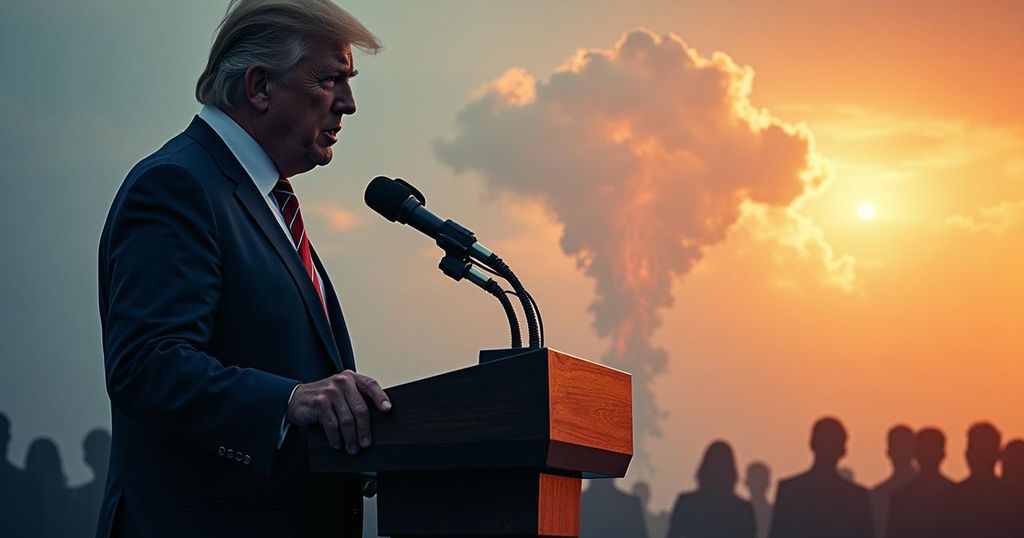Marjorie Taylor Greene’s Controversial Remarks on Hurricane Helene and Weather Manipulation

Rep. Marjorie Taylor Greene has faced criticism for suggesting that the Democratic Party controls the weather, in light of Hurricane Helene’s destruction, which resulted in over 215 fatalities. Her remarks appeared to politicize the disaster, linking it to upcoming elections and ignoring the scientific understanding of hurricanes as natural phenomena. This trend of misinformation highlights how tragic events can breed conspiracy theories, often without basis in reality.
Recently, Representative Marjorie Taylor Greene (R-Ga.) has come under scrutiny for her controversial remarks following the devastation caused by Hurricane Helene, a powerful Category 4 storm that affected several states including Florida, Georgia, North Carolina, South Carolina, and Virginia, resulting in over 200 fatalities and widespread destruction. Greene suggested through a post on social media that the Democratic Party possesses the ability to control the weather, stating, “Yes they can control the weather. It’s ridiculous for anyone to lie and say it can’t be done.” This claim, while lacking any scientific basis, is part of a broader trend of utilizing natural disasters to propagate political conspiracy theories. In her commentary, Greene referenced a political map that purportedly illustrated how the devastation from Hurricane Helene could influence upcoming elections, insinuating a connection between the storm and the electoral map of affected areas. It is crucial to note, however, that hurricanes are natural meteorological events caused by specific atmospheric and oceanic conditions, as explained by the National Oceanic and Atmospheric Administration (NOAA). Research conducted by NOAA indicates that man-made attempts to control tropical cyclones have historically proven ineffective due to the immense power of such storms. In the aftermath of Hurricane Helene, efforts for relief and recovery have mobilized at both federal and state levels with bipartisan support. Nevertheless, individuals aligned with the MAGA political movement have sought to politicize the tragedy, including former President Donald Trump’s unfounded claims about the federal government’s response to Republican areas in North Carolina. Conspiracy theorist Alex Jones further intensified the narrative by suggesting that the storm’s impact was targeted to disenfranchise Republican voters. Social media platforms have consequently become rife with additional unfounded theories, including claims of deliberate weather modification purportedly intended to facilitate land acquisitions for lithium mining operations. Such notions, although devoid of evidence, underscore a pattern wherein tragic events prompt speculative interpretations that attribute human motives to natural catastrophes. Representative Greene’s remarks are not an isolated incident; she has a history of fostering similar conspiracy theories, exemplified by her infamous comments linking disastrous events to outlandish explanations. This phenomenon illustrates the challenges in rational discourse, particularly regarding natural disasters, which often evoke a spectrum of responses ranging from genuine concern to unfounded speculation.
The article discusses the aftermath of Hurricane Helene, a devastating storm that has raised concerns not only about the immediate impact on affected populations but also how political discourse surrounding such events can devolve into conspiracy theories. Representative Marjorie Taylor Greene’s assertions regarding weather manipulation align with a broader trend of politicizing tragedies, particularly within certain factions of the political landscape. By examining the context of Greene’s claims and the scientific realities of hurricane formation and dynamics, the article highlights the disjunction between factual meteorological processes and the narratives that emerge in the wake of disasters.
In summary, Representative Marjorie Taylor Greene’s implications of weather control by the Democratic Party in the context of Hurricane Helene serve to further entrench political conspiracies within the public discourse surrounding natural disasters. Such claims are not only scientifically unfounded but also detract from the critical efforts needed for recovery and support for the victims of such storms. This incident acts as a reminder of the vulnerability of public conversation to the influence of misinformation, particularly in times of crisis.
Original Source: www.rollingstone.com








